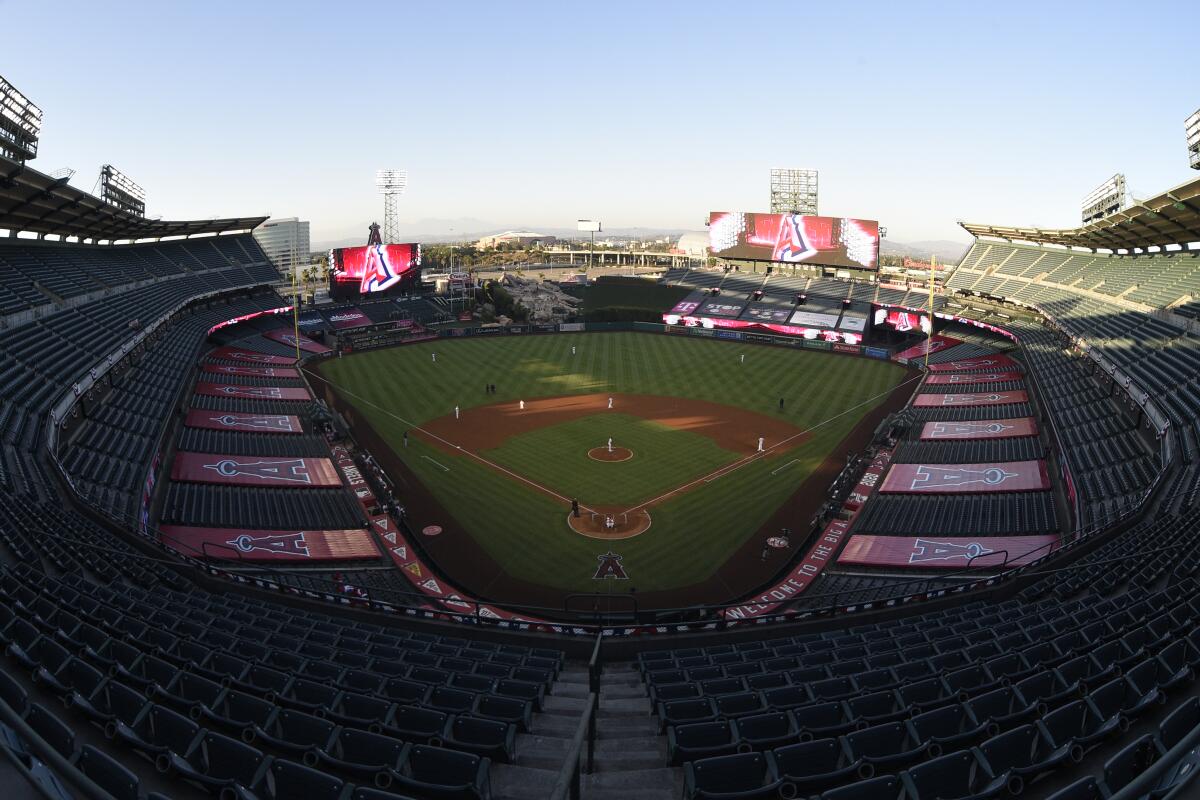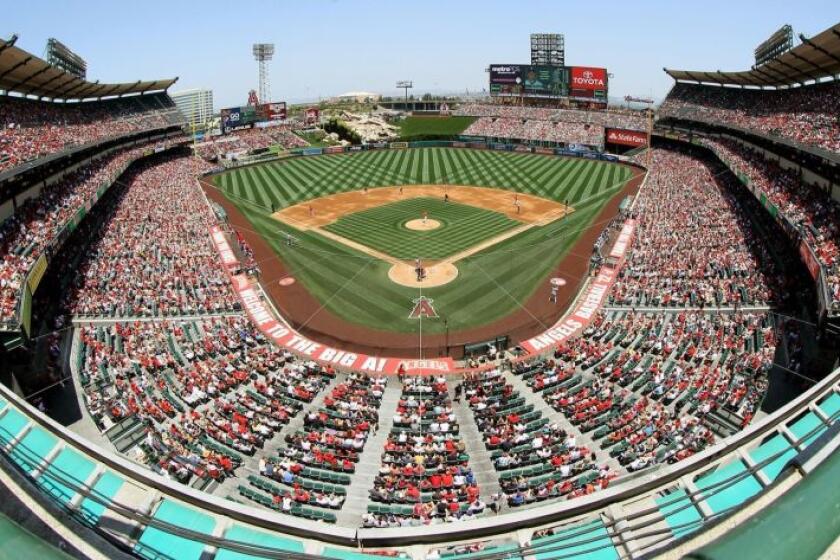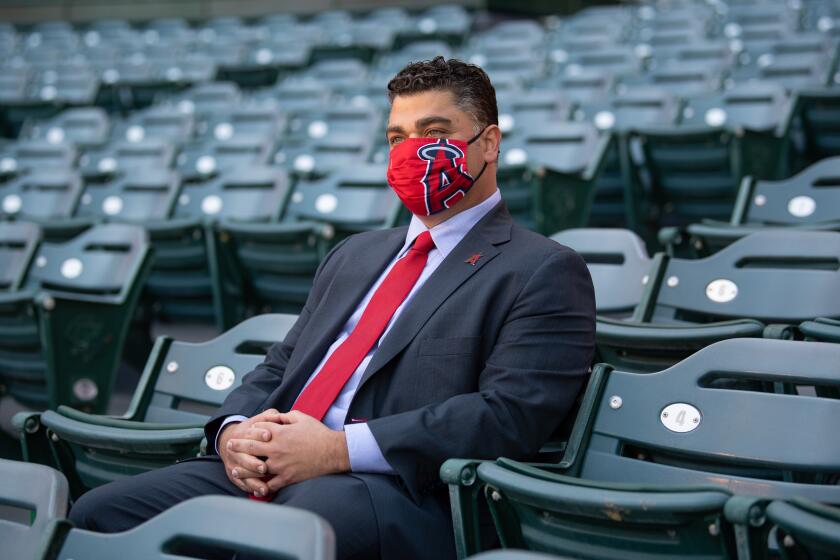Anaheim has a Plan B for stadium sale. Hometown lawmakers might not be on board

- Share via
Last Thursday, at 9:17 a.m., the Los Angeles Times posted a story about how the state housing agency had warned the city of Anaheim that its Angel Stadium sale might violate the law.
At 10:34 a.m., the city manager emailed the mayor and city council to alert them to the story, assuring them the warning letter was “preliminary” and city staffers were engaged in “productive communication” with the agency.
“We look forward to an amicable resolution with the State of California,” city manager Jim Vanderpool wrote.
That resolution, if there is one, might not require the city to reach an agreement with the housing agency. The city also is exploring what legislation or other action the governor and/or legislature could take that would bless the Angel Stadium sale, according to three people familiar with the city’s strategy but not authorized to discuss it.
“When it comes to sports teams and movie studios, Sacramento politicians tend to do backflips to give them what they want,” said Dan Schnur, who teaches at UC Berkeley and USC and served as spokesman for former Gov. Pete Wilson.
The agreement in which Anaheim sold Angel Stadium and parking lots to a company affiliated with team owner Arte Moreno may violate state law.
There’s a twist, though: Where legislators usually and unabashedly support projects that would benefit their hometowns, the two state legislators who represent the area where the stadium sits previously had warned the sale “may not be in the best interest of the taxpayers of Anaheim.”
The city could ask state legislators to introduce a bill that stipulates the stadium sale is in compliance with the affordable housing law in question, as the city contends. As of Monday, Anaheim spokeswoman Lauren Gold said the city “does not have a copy of any proposed legislation.”
Said Gold: “We are open to talking with any and all state partners on an issue of mutual concern.”
Erin Mellon, a spokeswoman for Gov. Gavin Newsom, did not respond to a message seeking comment.
The city still could resolve the matter with the housing agency. If a settlement were to require additional affordable housing, the city could have to decide whether it could afford the additional costs, or Angels owner Arte Moreno could have to decide whether to increase his investment to resolve a dispute concerning a law the city promised it had followed. Moreno’s development company has agreed to pay $150 million in cash for the 150-acre site.
The Angels scored seven runs in the ninth after Shohei Ohtani gave up seven runs in the first inning of an 11-8 win over the New York Yankees.
The deal has not closed, so the viability of the project could hinge on a settlement satisfactory to the state, the city and Moreno. In the absence of a settlement, the project could proceed, but with the city subject to fines so steep that the land sale could net Anaheim less than $2 for every $10 of market value.
The kind of legal exception that Anaheim could seek would not be unprecedented. In California sports, modifications to state environmental law were approved to streamline construction of the arenas for the Golden State Warriors and Sacramento Kings, of the Clippers’ planned arena in Inglewood, and of the Oakland Athletics’ proposed ballpark.
In Tustin, where Sen. Dave Min’s district includes the old Marine Corps Air Station, Min sponsored legislation that clarifies how the state affordable housing law — the one at the center of the Angel Stadium issue — should apply to what used to be federal land.
Min’s district also includes parts of Anaheim, and the district abuts the Angel Stadium site. Min said through a spokeswoman Monday that if any legislation were to be introduced with regard to the stadium sale, he would consult with the two state legislators whose district actually includes the stadium site, Assemblyman Tom Daly and Sen. Tom Umberg, and would “likely defer to their leadership.”
That is the general practice in Sacramento, Schnur said. He said it would be challenging — but not impossible — to pass a bill specific to one district without the support of the legislators from that district.
“Most of the other members take their cue from them,” Schnur said.
Daly, a former Anaheim mayor, declined to comment. Umberg did not respond to a message.
On Dec. 19, 2019 — one day before the Anaheim City Council voted to approve the Angel Stadium sale — Daly and Umberg sent the city a letter asking for the postponement of the vote, arguing it would be “premature” without clarification about the sale process.
As the MLB trade deadline nears, the Angels are in gray area between buying and selling. There’s no telling which direction their campaign might turn.
The city agreed to sell the property to Moreno’s development company for a price later finalized at $320 million. In 2020, the city agreed to lower the cash price to $150 million, with the remaining $170 million credited toward the guaranteed inclusion of 466 units of affordable housing and what Anaheim calls a “flagship city park” within the development.
The property could have been worth as much as $500 million on the open market, according to a city-commissioned appraisal, with the stadium demolished and the land vacant. The city council prioritized keeping the Angels over an open bidding process, and in so doing reinstated a lease that allowed the Angels to control development on the property through 2038. If the sale were to collapse, that lease would remain in effect.
At the time, a city official said the sale needed to be approved before 2019 ended, because changes to the affordable housing law that would take effect in 2020 could complicate the project.
In its warning letter to Anaheim, the state housing agency said what the city needed was an exclusive negotiating agreement in place with the Angels by Sept. 30, 2019. The city responded that it had a de facto agreement, even without a signed document, citing records of exclusive negotiations with the Angels dating to January 2019.
If the city’s argument is persuasive to the state housing agency, the matter could end there. But, even before finding out whether Plan A is successful, the city has started looking into Plan B.
More to Read
Go beyond the scoreboard
Get the latest on L.A.'s teams in the daily Sports Report newsletter.
You may occasionally receive promotional content from the Los Angeles Times.










